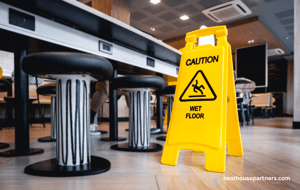Do I Need To Screen My Staff For Hearing Loss?
Do I Need To Screen My Staff For Hearing Loss?
James Rowland
Commercial Director James leads Account Management, Sales and Marketing at Neathouse Partners.Date
20 February 2023Updated
20 March 2024
Table of contents
Related articles
Tags
As an employer, the health and safety of your staff is always a priority but one aspect of their health that may often go overlooked is hearing.
Employer regulations governing this area include; The Control of Noise at Work Regulations 2005 (note also Regulation 5 of the Management of Health and Safety at Work Act, 1999).
This legislation applies to all employers, and self-employed individuals who are exposed to noise at work and The Act is designed to protect workers from the harmful effects of excess noise.
While it may not seem like the most pressing H&S issue, hearing loss can have a significant impact on an employee's job performance and, more importantly, future well-being.
As a result, it's in everyone's interest for you to understand your obligations as an employer, and how you can help your staff when it comes to screening for hearing loss so that the effects of this condition can be properly managed.
Read on to understand more about hearing loss at work including where your responsibilities lie as an employer and the best ways to screen staff.
What is Hearing Loss & How Does It Occur?
Hearing loss refers to a decrease in an individual's ability to hear sounds at the normal levels you would expect.
This can occur in one or both ears and can be temporary or permanent. There are many potential causes of hearing loss, including exposure to loud noise, ageing, genetics, and certain medications or medical conditions.
Common symptoms of hearing loss include difficulty understanding conversations in noisy environments, a feeling of fullness in the ears or a ringing sound.
Sadly, once an individual's hearing has gone, it is not something that can be brought back. As such, taking steps to prevent hearing loss deterioration is critical to maintaining the health and well-being of your staff at work.
What Do Employers Need To Be Aware Of?
As an employer, you must understand your obligations when it comes to the safety of your staff.
When it comes to hearing loss, you must take reasonable steps to protect workers from exposure to noise levels that exceed legal limits.
This includes:
- Providing information and training around hearing protection such as earplugs or ear defenders
- Ensure staff are correctly using hearing protection aids available to them.
- Make sure that regular hearing tests are offered to anyone who is exposed to noise levels that exceed legal limits.
- Familiarising yourself with the signs and symptoms of hearing loss so that early intervention can take place if required.
Hearing loss at work is often very preventable.
As such, employers should be clear on the fact that prolonged exposure to noise or excessive noise has been proven to cause hearing loss, and you have a duty of care to prevent that risk from impacting your employees at work.
Why Should Employers Screen For Hearing Loss?
Employers should consider if screening for hearing loss is appropriate for their employees because the longer that hearing loss goes untreated, the more likely it is to get worse or result in total loss of hearing.
Screening for hearing loss is the best way to identify any early deterioration in hearing so that it condition can be treated more effectively.
Aside from the obvious health implications of the condition, it is also recognised that poor hearing can lead to poor performance in the workplace too:
- Instructions can be missed or poorly understood. At best, this can impact an individual's ability to complete a task properly but at worst could have serious health and safety implications if working in environments with dangerous equipment.
- Hearing loss can negatively impact an employee's mental health. For example, individuals with hearing loss may experience social isolation or depression due to difficulty communicating with others.
By screening for hearing loss and providing support, employers can help prevent or address these issues early on.
When Should You Screen for Hearing Loss?
There are several factors to consider when deciding whether or not to screen for hearing loss at work including;
Industry and Job Duties: If your staff work in an industry that involves exposure to loud noise, such as construction or manufacturing, it may be particularly important to screen for hearing loss.
Similarly, if their job duties involve communication with others or the use of audio equipment, it may be important to ensure their hearing is functioning properly.
Noise calculators such as this one supplied by HSE.gov.uk can help calculate exposure and risk and are highly useful tools. As a general rule, those exposed to noise levels above 85 decibels are required to be offered ‘audiometry’ testing but best practice suggests it should be available to those above 80 decibels.
Age: As individuals age, they may be more likely to experience hearing loss. As such, it may be particularly important to offer to screen older staff members.
History of Hearing Loss: If an employee has a history of hearing loss, it may be important to screen them more frequently to ensure their hearing is not deteriorating further.
Symptoms: If an employee has been experiencing symptoms of hearing loss, such as difficulty hearing or ringing in their ears, it may be important to screen them.
Other Than Screening, What Else Can Employers Do?
The most effective methods of preventing hearing loss at work are not at the worker level but at technical and organisational ones.
Stopping noise at the source is the most important method of preventing hearing loss, and employers have a responsibility to show they have considered all methods to a reasonable level.
Such approaches can involve damping and reducing vibration but also changing processes or job rotation to reduce exposure.
How To Manage Hearing Loss Screening At Work
Audiometric testing involves using headphones and a machine to measure an individual's ability to hear sounds at different frequencies and volumes.
This type of testing is often done by a healthcare professional and is always undertaken in a quiet environment. Online hearing tests are not currently recommended.
Follow-up tests are usually organised initially annually.
If no changes to work exposure are occurring and there have not been any problems found on the initial post-exposure testing at 12 months, follow-up tests may be done at longer intervals of 2-3 years.
This is best discussed with occupational health specialists.
If you have determined that screening for hearing loss is important for your staff, consider the following ways of introducing and managing the process of screening for hearing loss at work;
- Have a process for early baseline screening of all new employees. Screening in high-risk environments should always be undertaken in the first year of work, but ideally before any exposure. This then potentially prevents claims of non-work related concurrent issues from being considered occupationally caused.
- Providing regularly timed screening for all staff, regardless of their role, a well-communicated method of self-reporting, and early supportive measures for hearing-related issues.
- Employers can also observe staff members for signs of hearing loss, such as difficulty hearing during meetings or interactions with colleagues or asking for repetition or clarification frequently.
- Processes should be in place in case hearing loss is identified. This may include providing further hearing loss prevention equipment in noisy areas or providing amplification devices or ensuring that meetings and communications are accessible for those with hearing loss.
Conclusion
Employees have a clearly defined responsibility to protect their employees from preventable hearing loss.
This means that all employers of staff who are exposed to excessive noise as defined by the Noise at Work regulations must show they have processes in place to reduce that risk at an occupational and individual level. This includes audiometry screening.
Employers should consider the industry, job duties, age, history of hearing loss, and symptoms of their staff members when determining whether or not to screen for hearing loss, and whilst the driver for this is to support staff and prevent a potentially traumatic condition, employers can also benefit.
Not only can identifying hearing loss and taking steps to prevent it improves job performance and prevent potential mistakes, but it can also improve the mental health and well-being of employees.
Related blog posts

Safety in Construction: A Snapshot for Employers

6 Steps Staff Should Follow After An Accident At Work

Understanding Safety Signage Regulations as a UK Employer
Have questions?
Get in touch today
Contact us, and our team will get back to you within 24 hours. We value your questions and are committed to getting them answered quickly.


Hello! I am Nicky
Just fill in the form below with your details, and I will arrange for a member of our team to give you a call.
By clicking, you agree to our Privacy Policy







